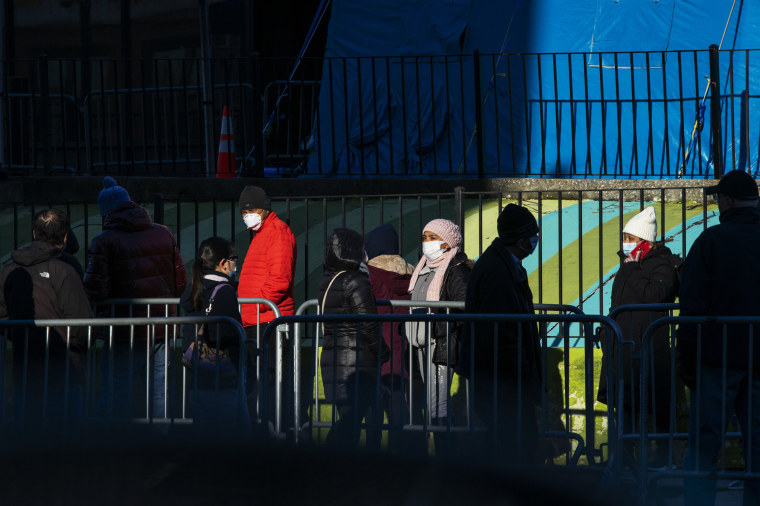Black doctors say the burden of the coronavirus crisis weighs exponentially on them. They harbor concern about the history of health care inequities in underserved communities and worry about how testing and services will play out as the virus spreads from coast to coast.
And so, they go about their business with multiple responsibilities: do their jobs, make sure black communities are not left behind in the process of treatment, and convince people of color to trust the services they hope will become accessible.
“Make no mistake: Nothing diminishes our full obligations,” Dr. Rueben C. Warren, director,of the National Center for Bioethics in Research and Health Care at Tuskegee University, told NBC News. “But there absolutely is an added responsibility on us to bring assurances to our communities, to advocate for our communities.
“In fact, we are not only obligated but we have a desire to make sure that equity exists,” he said. “Historically, that has not happened, which is a concern.”
That concern manifests itself in a lack of trust that the government will provide balanced opportunities for testing and treatment of the coronavirus—and that the treatment will be viable.
Full coverage of the coronavirus outbreak
“The trust question is not only about medical care but also about leadership,” Warren said. “The question is around equity, ethics and social justice. It is a new health concern, but why would the pattern be any different?”
Which is why Dr. Pierre Vigilance, former associate dean for practice at George Washington School of Public Health, a former health commissioner for DC, and currently Principal & Founder of a population health operations management & advisory consultancy, has formed a group to make an impact on providing innovative personal protection equipment, or PPE.
His team so far consists of a public health expert; an emergency manager;a finance and continuation-of-operation stalwart; a mask designer/architect; and a textile specialist to determine if effective masks can be made out of alternative materials. All but one is African American. Their goal is to address the dearth of PPE, help craft policy to make unused city funds accessible to pay for the equipment in mass quantities, and to train personnel on how to effectively work remotely as offices close during the shutdown.
“We are somewhat different from a straight vertical public health group or medical group,” Vigilance said. “We have the sensibilities of a public health regulatory (group), but also have a different-thinking mindset.”
Dr. William Cooper, a thoracic surgeon in Marietta, Georgia, considers Vigilance’s ambition critical.
“This is extremely important work,” he said. “Physicians, nurses and allied health care professionals all over the globe have demonstrated much courage and professionalism. This pandemic has caught the U.S. off guard and ill-equipped to protect health care workers from contracting COVID-19, further weakening the ability to treat individuals who are most in need.”
Those in need include people of color, many of whom have a mental barrier to overcome -- racial inequities -- to accept treatment, some doctors say.
There is distrust among some in the black community of “what was being made available,” Vigilance said. “That’s the result of the long-lasting impact of the thought that a vaccination outside of childhood is not something we believe is needed.”
Warren said that the lack of trust is “grounded in the African American experience in the United States.”
“Look at the Middle Passage, he said, referring to the route of the slave trade. “We didn’t come here as human beings; we were forced here as cargo. . . . So there was this position that we’re less than human. And there’s been no change in that fundamental principle.
“Things have gotten better, but they haven’t gotten better equity. In fact, in some ways, it’s gotten worse.”
The so-called Tuskegee Study of Untreated Syphilis in the Negro Male—when hundreds of African American men were deliberately infected with syphilis from 1932 to 1972 after being told they were receiving free government health care—serves as a symbol of the cynicism in the black community.
Download the NBC News app for full coverage of the coronavirus outbreak
“That’s the root of much of the distrust,” Vigilance said. “Some are well aware and know that history. But many triggers of distrust are being replaced by family history, like, ‘Uncle Johnny was fine but he went to the doctor and everything went downhill.’ That may be how it appeared or how it was, but there were a number of things that Uncle Johnny had against him that had nothing to do with the history. But that’s the belief, and it’s as much a part of it as medical and public health maleficence.”
These barriers make the black doctor’s efforts to inform, encourage and support the communities of color challenging.
Vigilance recalled leading the treatment for the H1N1 swine flu epidemic in the Washington area in 2009.
“We received a good amount of vaccinations and were open up to all clinics in every ward in D.C., even when there were low turnouts week after week,” he said. “But the local people were not taking advantage.”
He said that anonblack families of four would come to get vaccinated from Northern Virginia, but black people who lived across the street would not. “That’s the depth of distrust that exists,” Vigilance said.
“And with novel viruses, where the threat is higher, the distrust level is higher,” he said. “So we have some work to do, and we are willing to do it.”
